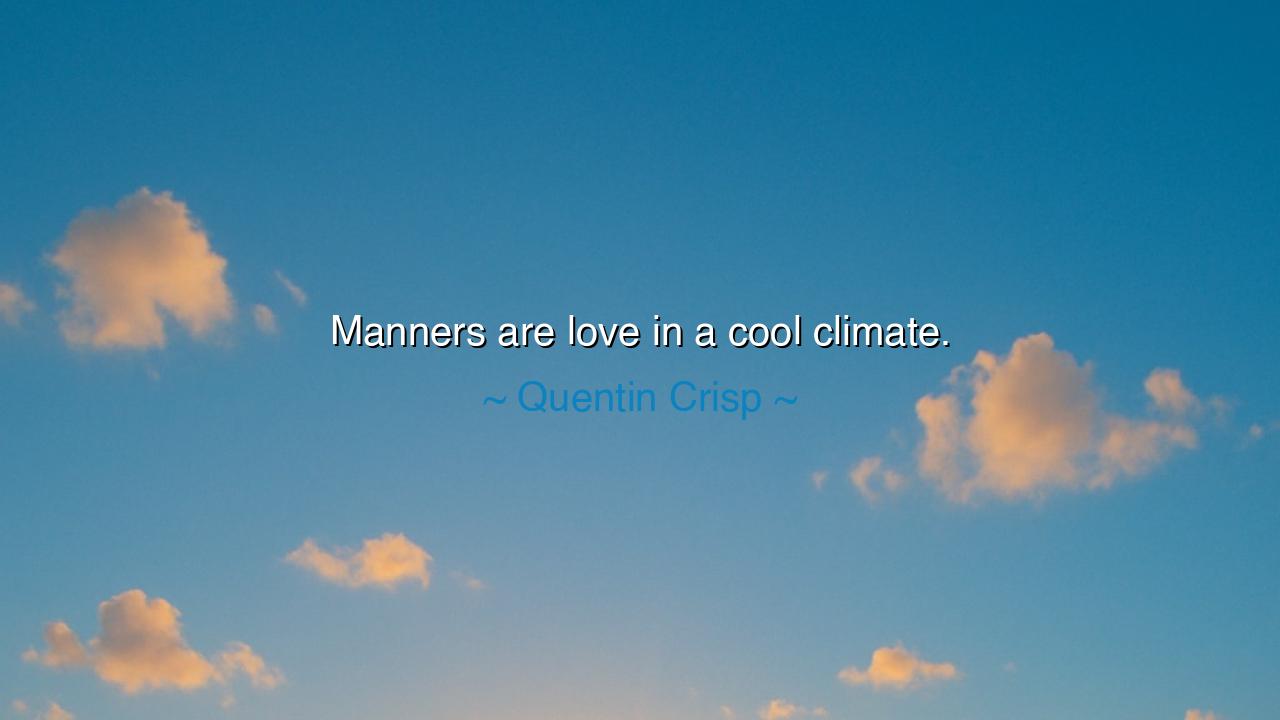
Manners are love in a cool climate.






When Quentin Crisp declared, “Manners are love in a cool climate,” he whispered an ancient truth wrapped in a modern tongue: that manners—those small, seemingly insignificant gestures of politeness—are the invisible threads that bind us together in a world that can often feel cold and indifferent. The warmth of love cannot always be freely given, especially when the world seems to lack warmth itself. But manners, Crisp suggests, can act as the conduit through which that love flows, even in the most chilly of environments. They are the subtle softness in the harshness, the bridge between souls when the heart may hesitate to speak.
The ancients understood the power of manners and civility, for they knew that in a world of discord and violence, the smallest act of kindness or courtesy could hold a power greater than the sword. The philosopher Aristotle taught that to live a virtuous life was to practice the balance between excess and deficiency. In this way, manners are an expression of virtue—not in grand gestures, but in the quiet, often unseen ways that we treat each other. A polite word, a kind gesture, a moment of attentiveness: these are not just habits but expressions of care in a world that can seem cold and detached.
Consider the story of Socrates, who was revered for his ability to engage in dialogue with all people, regardless of their status. In the crowded, noisy streets of Athens, Socrates practiced his form of manners, not by adhering to social decorum, but by engaging with respect and genuine curiosity. It was through this humble yet profound civility that he won the hearts of his followers. He understood that manners were not about appearance or ceremony, but about treating others with dignity—and in doing so, he created a space for true connection. Like Crisp’s words, Socrates’ way was love expressed in the coolness of philosophical discourse, inviting the heart to follow where the mind leads.
But manners can sometimes seem a facade, a thin veil that hides the deeper emotions of the soul. Yet the wise know that manners are not deception—they are a language of care, even when the heart may be wrapped in layers of fear, distrust, or coldness. The emperor Marcus Aurelius, in his meditations, reminded himself daily to act with dignity, with respect for others, even if their actions did not deserve such treatment. His reflections on virtue spoke to the notion that civility—manners—is the path to inner peace, for to live with grace in a harsh world is the greatest victory of all.
In the same vein, Crisp’s insight suggests that the cool climate of the world may not always be one of warmth, but that does not mean we must withdraw from it. In fact, the coldness of the world only makes the flame of manners shine brighter. True love is not always easy to give, nor always welcomed in a world filled with anger, fear, and suspicion. But manners—those simple, deliberate actions of courtesy—offer the opportunity to show love even when we cannot show it fully. They are small gestures that say, “I see you. I acknowledge you. I treat you with respect.” And in a world that often feels indifferent, these gestures carry immeasurable weight.
This principle is exemplified in the story of Mahatma Gandhi, who led a movement not with swords, but with the softness of nonviolent resistance. In a world dominated by violence and oppression, his manners—his capacity for dignity, even in the face of adversity—became the foundation of his power. Through nonviolence, he showed that love, even in a world of cold cruelty, can overcome even the darkest forces. Gandhi’s humility, his ability to speak with respect even to his oppressors, is a testament to the enduring power of manners. It is a reminder that even in the harshest climates, the gentlest gestures can change the world.
So, the lesson we take from Quentin Crisp’s words is both simple and profound: Manners are a form of love, especially when the world feels cold and disconnected. They are the bridge we build between ourselves and others, the silent affirmation that we are all worthy of kindness, even when the world does not always show it. Love may not always be freely given, but manners offer us a way to show it, even in small ways. It is a reminder to approach each moment with grace, to choose civility over aggression, and to act with kindness when the world around us seems indifferent.
Let us, therefore, live our lives not in reaction to the harshness of the world, but in response to it—with manners, with dignity, and with respect. When we offer others the gift of our civility, we may never know the true impact it will have on their hearts. But we can be sure that, like the sun warming the earth in winter, our small acts of kindness will warm not just the world around us, but ourselves as well.






AAdministratorAdministrator
Welcome, honored guests. Please leave a comment, we will respond soon